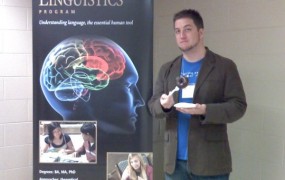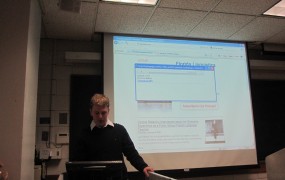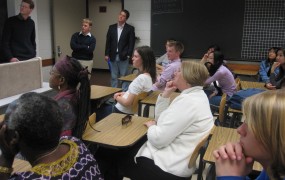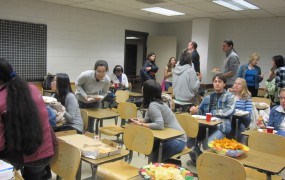What is Grammar?
Friday, November 12th, 2010 @ 1:24AM
–Article by Lee Ballard
If we asked people to brainstorm on what they think about when they hear the word “grammar,” I think we would get some interesting results. When the word “grammar” comes up in conversation, I’ve noticed that people I meet regularly confuse it with a few things, which I call “negative experiences with grammar.” From my experience, people’s associations of the word “grammar” fall into three categories.
First, grammar is misunderstood as a way to punctuate writing.
Second, grammar is misunderstood as a way to reformulate phrases and sentences in written prose from what sound natural in ordinary speech. Grammar is basically made up of ways to speak “correctly” as opposed to what’s natural. Natural speech, then, is by extension presumed to be wrong. But if you can banish what sounds natural, you will be using language in the right way, so they say.
Finally, for non-native speakers learning a new language, grammar is often thought to be a set of mysterious endings or sentence patterns that are out there in books and tables, but only vaguely understood. These patterns, especially word endings that don’t transfer 1-to-1 from their native language, are considered redundant and unneeded. By intermediate learners of languages, correct grammar is often seen as a waste of time, because it is not really necessary for communication. Nonetheless, the best students are still capable of memorizing this grammar, usually because it’s “like math” or “logical.”
The linguist’s conception of grammar is necessarily in conflict with all three of people’s negative experiences with grammar.
First of all, grammar cannot possibly have anything to do with punctuation, because language is primarily spoken, not written. Most languages do not have a writing system (and some have more than one writing system), and they are still full-fledged, healthy languages.
In regard to misconception number two, everyday speech is the natural life of a language, and conscious rules are forced and unnatural. Think about what these rules imply about how language really works. For every prescriptive rule of the form “don’t do X” or “always do Y,” the reason for the rule is that people do do X, or aren’t really too keen on doing Y. Therefore, the grammar of the linguist and grammar of the schoolteacher are necessarily in conflict. Now we come to number three—foreign language learners often have such little interaction with native speakers or native speaker communities that language becomes too abstract. Foreign languages are thus often reduced to mathematical systems that can be mastered silently at home and in private. “Grammar” of this type can be graded easily by non-experts, as many foreign language teachers have but a mediocre grasp of the language they’re teaching, and possibly no real experience living in a community where that language is spoken. For communication, foreign language “grammar” is quite unrealistically presented and not always useful.
For linguists, grammar might be defined as “the set of intuitions that native speakers have about what sentences sound good and what sentences don’t sound good.” These are called “grammaticality judgments,” and they make up a large body of linguistic data. Explaining these judgments is the goal of syntax, one of the traditional subfields of modern language science. Grammar for a modern linguist is something that is acquired unconsciously by children, because humans are hard-wired for language.
Grammar is also the source of the creativity of native speakers. The sentences we say are not memorized. The rules are not known consciously, so the rules governing language cannot be put into a book. Any book (even a linguistics book).
For me, the disconnect between “grammar” as the world views it and what little knowledge I have of the real grammars of language makes me feel a little uneasy. Actually, it feels a little like Gnosticism, like I’ve got some secret knowledge that the mainstream doesn’t have. I am embarrassed that my beliefs, which are quite traditional and accepted within my own field, make me sound like an insane person to so-called language experts outside of linguistics.
A few facts muddy the waters and cloud native speakers’ judgments. Trying to be correct, accommodation, variation, and sentences that are just hard to judge end up complicating a task that should otherwise be simple to do.
When a linguist gives a native speaker a sentence, negative experience number two often comes into play. Instead of answering with a yes or no, the native speaker responds with “I don’t know – what’s correct?” Another version of this: when asked a question about language, we remember some rule that we heard somewhere, and try to implement that rule on the fly. Sometimes we’re not quite sure how that rule was supposed to work, but we figure that we might as well try to follow it. Now that someone’s asking, it’s really important to “get it right.”
Another problem with getting clear judgments is that speakers of a language often like to cut their conversation partner some slack, even to the extent of starting to talk like their friends. This is called “accommodation theory.” When native speakers interact with non-native speakers, many of us have a tendency to accommodate our speech, consciously or unconsciously, to the way the other person is talking. If they ask us if something is right, we may cut them some slack, or even lose track of our own native grammar, because we’re too busy molding our speech to non-native patterns.
Another problem complicating grammar is that some statements are okay in one variety of a language, but not in another. So if in America we say, “When I got there, she hadn’t yet gotten my e-mail”, and in some other English-speaking country they say “When I arrived, she hadn’t yet got my e-mail”, native speakers of the first variety should feel confident saying that the former version sounds better to them than the latter. But this is not always the case, because our conscious knowledge about other varieties of the same “language” clouds our judgment of what our unconscious, grammatical knowledge really is.
Finally, some statements really are unclear. They may be marginally correct, or we may be able to contrive some strange situation in which we would expect the sentence to be uttered. In cases like this, it’s hard to give a thumbs-up or thumbs-down response.
Unfortunately, things don’t look too good for the linguistic/scientific understanding of grammar. People continue to learn foreign languages where grammar is idealized in tables for solo memorization. This grammar is drilled until students are bored to tears and forget why they wanted to learn the language in the first place. We don’t use our commas correctly, which is supposedly a really bad thing. Traditional educational establishments, like some teachers of high school English, college writing teachers, and experts in non-language fields, continue to propagate old prescriptive ideas about language without questioning them or justifying their out-of-date rules. Publishing houses put out reference books that contribute to an understanding of language as static, right/wrong (with the “right” version in their books), and memorized (not creative).
If we want to make progress, maybe we should just forget everything we’ve ever heard about grammar. Then maybe we’ll realize that if we just talk normally, we’ve known how to say what we wanted to all along.
Posted by floridalinguistics
Categories: Featured, Lee Ballard









